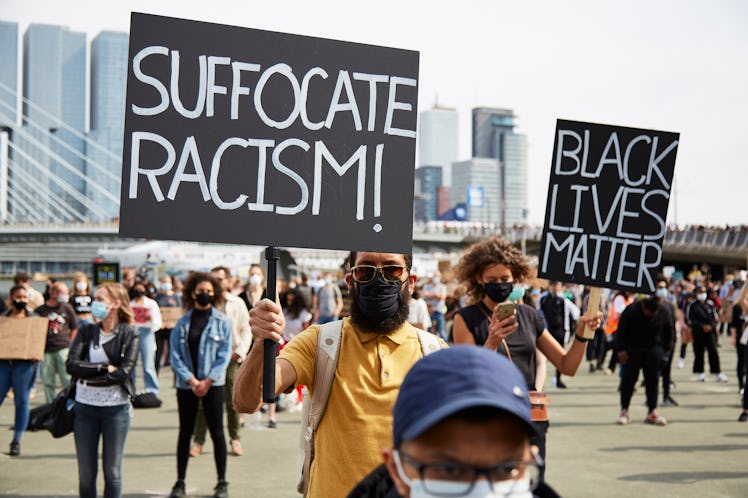
It's Not Enough To Just Be "Not Racist"
Following the outrage sparked by the recent deaths of Black Americans George Floyd, Breonna Taylor, and Tony McDade at the hands of police, as well as Ahmaud Arbery, who was killed in a confrontation with two white men, protests continue across the United States in support of Black Lives Matter and the fight for racial justice. In addition to protesting, Americans are looking for ways to take action to work against racism. But what is anti-racism, exactly? Anti-racism is all about active participation in dismantling a system of racism, and experts explain how you can begin to take action in your daily life.
Before you can get started on dismantling racism, Beverly Tatum, Ph.D, president emerita of Spelman College, tells Elite Daily it's essential to understand what racism actually is. Tatum says people inaccurately use the terms "prejudice" and "racism" interchangeably. But racism is actually a system of structural attitudes and policies, which includes but isn't limited to individual prejudiced beliefs and attitudes. "[Racism] is a system involving cultural messages and institutional policies and practices, as well as the beliefs and actions of individuals. In short, racism is a system of advantage based on race," she explains. Importantly, you don't have to personally be racist to be part of upholding racist structures. "That system can operate and be perpetuated even by individuals who don’t hold negative attitudes about people of color," she says.
To be anti-racist, Tatum explains, "is to actively work against the system of racism by taking action, supporting anti-racist policies and practices, and expressing anti-racist ideas." She adds, "There is no such thing as 'passive anti-racism.'" Tatum says one key aspect of practicing anti-racism is taking action by standing up for your beliefs and speaking out against racist behaviors and statements amongst people you know.
Similarly, the Smithsonian National Museum of African American History & Culture (NMAAHC) defines anti-racism as "a conscious decision to make frequent, consistent, equitable choices daily." In short, it's not simply enough to just not be personally racist — you have to work against the system as a whole.
Deborah L. Stroman, Ph.D, CLU, a leadership and equity professor at the University of North Carolina and racial equity consultant, highlights the importance of fighting racism beyond obvious, but slow-moving, ways like promoting legislation. "Prior to leaping into creating and advocating for new coalitions and policies, please take the time to reflect on how you are currently acting to uphold the current racist structures and culture," says Stroman.
According to Stroman, the first concrete step to practicing anti-racism is self-reflection. "Personal examination is the first action step that is needed to break down the bias and bigotry that maintains the inequities," she says. This means taking a look at whether you've ignorantly or harmfully perpetuated racism, as well as whether you've confronted racism in your own life and how you react to any racist actions you encounter from friends, family, and colleagues — such as perpetuating stereotypes or making racist jokes.
There is no such thing as "not being racist," Tatum says. "There are only two choices, supporting the system of racism (actively or passively), or working to dismantle the system of racism."
If you're a white ally to Black Americans, Stroman says being anti-racist starts with spending time with people with other perspectives and experiences of racism. "The more time we spend with people who have a different culture and ways of being serves to enrich our own knowledge and motivation to be better," she explains. However, this does not mean you should tokenize your friends of other races or expect them to educate you, but rather, make the effort to support them and empathize with their needs, while learning from and about their perspectives on important issues.
As an anti-racist, it's important to realize the responsibility to fight inequalities doesn't fall to Black Americans and people of color — it's a universal responsibility. Educating yourself on anti-racist practices is imperative. Tatum recommends Ibram Kendi's How to be an Antiracist, White Fragility by Robin DiAngelo, as well as her own books, Why Are All the Black Kids Sitting Together in the Cafeteria? And Other Conversations About Race, and Can We Talk About Race? And Other Conversations in an Era of School Resegregation to help with your self-reflection.
It's also important to vote for officials who champion anti-racist movements. In a letter posted on Medium on Monday, June 1, former President Barack Obama suggests voting is a huge factor in inciting a change: "The bottom line is this: if we want to bring about real change, then the choice isn’t between protest and politics. We have to do both." You can also join community groups like Showing Up for Racial Justice, which is group working to educate and fight racial injustice and white supremacy, or Stand Against Racism, led by the YWCA, which hosts events in different states to educate and empower others to take a stand against racial and gender inequality. To fully practice anti-racism, Tatum says, "Make a personal commitment to educate yourself, and practice daily."
Experts cited:
Beverly Tatum, Ph.D, President Emerita of Spelman College, author and speaker
Deborah L. Stroman, Ph.D, CLU, University of North Carolina Leadership and Equity Professor and racial equity consultant
This article was originally published on